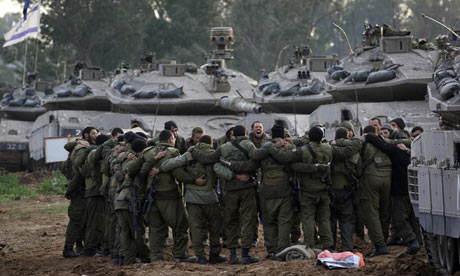Gaza war crime claims gather pace as more troops speak out
Fresh allegations have come to light that gung-ho leadership inculcated a culture of disregard for Palestinian casualties
- The Observer, Sunday 22 March 2009
- Article history

Israeli soldiers stand together at a military staging area before moving towards the northern Gaza Strip. Photograph: Baz Ratner/Reuters
Although Breaking the Silence's report is not due to be published for several months, the testimony it has received already suggests widespread abuses stemming from orders originating with the Israeli military chain of command.
"This is not a military that we recognise," said Mikhael Manekin, one of the former soldiers involved with the group. "This is in a different category to things we have seen before. We have spoken to a lot of different people who served in different places in Gaza, including officers. We are not talking about some units being more aggressive than others, but underlying policy. So much so that we are talking to soldiers who said that they were having to restrain the orders given."
Manekin described how soldiers had reported their units being specifically warned by officers not to discuss what they had seen and done in Gaza.
The outlines of the evidence gathered comes hard on the heels of the disclosure by the Oranim Academy's pre-military course last week of devastating witness accounts supplied by soldiers involved in the fighting, including the "unjustified" shooting of civilians.
The claims appear to add credence to widespread claims of Israeli soldiers firing on civilians, made by Palestinians to journalists and international investigators and lawyers who entered Gaza at the end of the conflict and in its aftermath.
With Israeli newspapers threatening new disclosures, the New York Times has weighed in with an interview with a reservist describing the rules of engagement for the Gaza operation. Amir Marmor, a 33-year-old military reservist, told the newspaper that he was stunned to discover the way civilian casualties were discussed in training talks before his tank unit entered Gaza in January.
"Shoot and don't worry about the consequences" was the message from commanders, said Marmor. Describing the behaviour of a lieutenant-colonel who briefed the troops, Marmor added: "His whole demeanour was extremely gung-ho. This is very, very different from my usual experience. I have been doing reserve duty for 12 years, and it was always an issue how to avoid causing civilian injuries. He said that in this operation, we are not taking any chances. Morality aside, we have to do our job. We will cry about it later."
These are not the first allegations of war crimes levelled at the Israeli military. Last Thursday, the special rapporteur to the UN Human Rights Council, Richard Falk, said that the assault on Gaza appeared to be a "war crime of the greatest magnitude" and called on the UN to establish an experts' group to investigate potential violations.
Attempts by the Israeli media to publish the rules of engagement for the Gaza campaign have been blocked by the military censor, but in the past couple of weeks the contents of those rules have begun to to emerge in anecdotal evidence - suggesting strongly that soldiers were told to avoid Israeli casualties at all costs by means of the massive use of firepower in a densely populated urban environment.
Worrying new questions have also been raised about the culture of the Israeli military, indicating a high level of dehumanisation and disregard for Palestinians among the chain of command and even among the military rabbinate.
An investigation by reporter Uri Blau, published on Friday in Haaretz, disclosed how Israeli soldiers were ordering T-shirts to mark the end of operations, featuring grotesque images including dead babies, mothers weeping by their children's graves, a gun aimed at a child and bombed-out mosques.
Another T-shirt designed for infantry snipers bears the inscription "Better use Durex" next to a picture of a dead Palestinian baby, with his weeping mother and a teddy bear beside him. A shirt designed for the Givati Brigade's Shaked battalion depicts a pregnant Palestinian woman with a bull's-eye superimposed on her belly, with the slogan, in English, "1 shot, 2 kills".
The claims have sparked a bitter debate within Israel's defence forces and wider society over the "morality" of the IDF and its behaviour in Gaza.
Since the first claims appeared, other Israeli media have run articles criticising the head of the military academy who revealed the soldiers' testimony, while others have run interviews with soldiers denying that the IDF had been involved in any wrong-doing and questioning the motives of those who had come forward.
"I don't believe there were soldiers who were looking to kill [Palestinians] for no reason," 21-year-old Givati Brigade soldier Assaf Danziger was quoted by Yedioth Aharonot. "What happened there was not enjoyable for anyone; we wanted it to end as soon as possible and tried to avoid contact with innocent civilians."























No comments:
Post a Comment